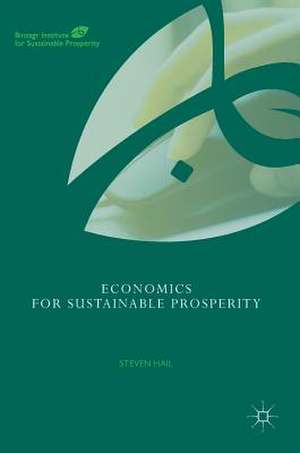Economics for Sustainable Prosperity: Binzagr Institute for Sustainable Prosperity
Autor Steven Hailen Limba Engleză Hardback – 24 mai 2018
| Toate formatele și edițiile | Preț | Express |
|---|---|---|
| Paperback (1) | 724.80 lei 6-8 săpt. | |
| Springer International Publishing – 10 ian 2019 | 724.80 lei 6-8 săpt. | |
| Hardback (1) | 730.02 lei 6-8 săpt. | |
| Springer International Publishing – 24 mai 2018 | 730.02 lei 6-8 săpt. |
Preț: 730.02 lei
Preț vechi: 890.27 lei
-18% Nou
Puncte Express: 1095
Preț estimativ în valută:
139.68€ • 145.86$ • 115.35£
139.68€ • 145.86$ • 115.35£
Carte tipărită la comandă
Livrare economică 15-29 aprilie
Preluare comenzi: 021 569.72.76
Specificații
ISBN-13: 9783319909806
ISBN-10: 3319909800
Pagini: 288
Ilustrații: XI, 289 p. 24 illus.
Dimensiuni: 148 x 210 x 24 mm
Greutate: 0.51 kg
Ediția:1st ed. 2018
Editura: Springer International Publishing
Colecția Palgrave Macmillan
Seria Binzagr Institute for Sustainable Prosperity
Locul publicării:Cham, Switzerland
ISBN-10: 3319909800
Pagini: 288
Ilustrații: XI, 289 p. 24 illus.
Dimensiuni: 148 x 210 x 24 mm
Greutate: 0.51 kg
Ediția:1st ed. 2018
Editura: Springer International Publishing
Colecția Palgrave Macmillan
Seria Binzagr Institute for Sustainable Prosperity
Locul publicării:Cham, Switzerland
Cuprins
1. Introduction: Searching for a New Economics.- 2. ‘Real’ Analysis of an Unreal World.- 3. New Wisdom from Old Books.- 4. Behavioral Foundations.- 5. Modern Monetary Theory.- 6. Stock-Flow Consistent Monetary Economics.- 7. A Job Guarantee.- 8. Conclusion: Economics for Sustainable Prosperity.
Notă biografică
Steven Hail is a Research Scholar at the Binzagr Institute for Sustainable Prosperity and a Lecturer in the School of Economics at the University of Adelaide in South Australia. During the 1990s, he trained staff from many international banks and the Bank of England. He now teaches modern monetary theory and regularly writes magazine articles and appears in podcasts relating to MMT.
Textul de pe ultima copertă
“Steven Hail has coalesced disparate yet interdependent conceptualizations of real world phenomena in a brilliant and crucial way to produce a blueprint for sustainable prosperity. The book is essential reading for anyone searching for an alternative to the mainstream orthodoxy that has played no small part in the creation of an ecologically unsustainable and inequitable world.”
—Philip Lawn, University of Newcastle, Australia; author of Resolving the Climate Change Crisis- The Ecological Economics of Climate Change
—Claire Connelly, award-winning journalist, Renegade Inc.
"Dr. Hail makes a compelling case for sustainability through a modern money lens that is accessible and useful for the 99%."
—Steven Grumbine, founder, Real Progressives
The central argument of this book is that the foundations for sustainable prosperity lie in an approach to economic management based on modern monetary theory and a job guarantee. This approach builds on the work of Keynes, Kalecki, Minsky, Davidson, Godley and other Post- Keynesian economists—as well as research by behavioral economists including Simon, Kahneman and Loewenstein—to explore the role that a permanent, equitable job guarantee could play in building an inclusive, participatory and just society. Orthodox (neoclassical) economics, in its various forms, has failed to deliver sustainable prosperity. An important reason for this failure is its lack of realistic foundations. It misrepresents both human nature and economic institutions, and its use as a frame for the development and assessment of economic policy proposals has had disastrous consequences for social inclusion and the quality of life of millions of people. This book discusses an alternative, more realistic and more useful set of economic foundations, which could deliver the opportunity of a decent quality of life with dignity to all.
Caracteristici
Builds the case for a permanent and inclusive job guarantee Argues that equitable full employment and ecological sustainability should replace growing the economy as the goals of policy makers Draws from Post-Keynesian and behavioral economics traditions to show an alternative to orthodox macroeconomics



